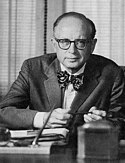Daniel J. Boorstin Quote
I became aware, Toynbee recalled, of a difference in national traditions. Where the German a priori method drew blank, let us see what could be done by English empiricism.Focusing on the genesis and survival of societies, his original approach was eminently practical and fact-oriented. He started with an intriguing paradox. The view that certain environments, presenting easy and comfortable conditions of life, provide the key to an explanation of the origin of civilizations is examined and rejected. Instead he suggests the possibility that man achieves civilization, not as a result of superior biological endowment or geographical environment, but as a response to a challenge in a situation of special difficulty which rouses him to make hitherto unprecedented effort. Both sides of the paradox are supported by facts from around the earth:
I became aware, Toynbee recalled, of a difference in national traditions. Where the German a priori method drew blank, let us see what could be done by English empiricism.Focusing on the genesis and survival of societies, his original approach was eminently practical and fact-oriented. He started with an intriguing paradox. The view that certain environments, presenting easy and comfortable conditions of life, provide the key to an explanation of the origin of civilizations is examined and rejected. Instead he suggests the possibility that man achieves civilization, not as a result of superior biological endowment or geographical environment, but as a response to a challenge in a situation of special difficulty which rouses him to make hitherto unprecedented effort. Both sides of the paradox are supported by facts from around the earth:
Related Quotes
About Daniel J. Boorstin
Repudiating his youthful membership in the Communist Party, Boorstin became a political conservative and a prominent exponent of consensus history. He argued in The Genius of American Politics (1953) that ideology, propaganda, and political theory are foreign to America. His writings were often seen, along with those of historians such as Richard Hofstadter, Louis Hartz and Clinton Rossiter, as belonging to the "consensus school", which emphasized the unity of the American people and downplayed class and social conflict. Boorstin especially praised inventors and entrepreneurs as central to the American success story.
